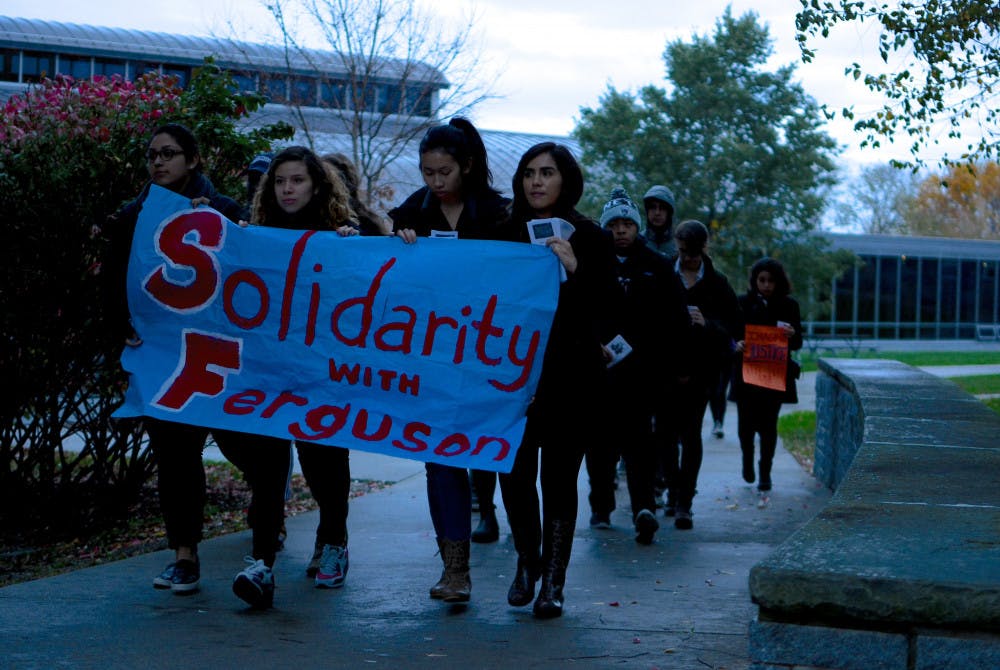This past Wednesday, Oct. 22, led by the student organization WOC (Women of Color), a group of students and faculty members held a silent March on campus against police brutality. Wednesday marked the National Day to Stop Police Brutality, Repression, and the Criminalization of a Generation.
“Basically we are just having a silent march in solidarity with what’s been happening over the summer, and what’s been happening throughout American history,” one of the student leaders, Ola Fadairo ’15, said as he introduced the event.
“It was mostly started by what was happening this summer in Ferguson with Mike Brown, [and] what happened in New York, and pretty much everywhere in the United States where men of color were gunned down by police officers for no reason. So we are just going to bring awareness. This is [going to be] a silent, peaceful march. And we are just trying to bring moreawareness to campus because it is something that should be talked about but not talked about enough,” Fadairo said.
Around 5:30 pm, more than fifty students and three faculty members gathered in front of Ross dining hall for the march. The march started outside of the Ross Dining Hall. Protesters then passed ADK and walked down the hill to the Davis Library, then passed Old Chapel and McCullough, and ended in front of Mead Chapel. The group made stops inside Ross Dining Hall, the library and in front of Mead Chapel, where different students made speeches to express their cause and promote awareness.
In Ross Dining Hall, after a short speech, a student speaker requested that students stand with them in silence. A few students went up first and then all the students in the dining hall stood up along with the marchers.
During the march, many students carried banners and posters which read “Solidarity with Ferguson”, “Hands Up, Don’t Shoot”, “Black Lives Matter”, “Sagging Pants is NOT Probable cause” and “Midd Divest from White Supremacy”, to name a few. The weather was cloudy with drizzle, the students walked in the rain with their posters and banners in hand, silently.
“For two generations, black and Latino youth have been shipped to prison in numbers never before seen anywhere else in the world,” President of Women of Color Jackie Park ’15 said.
“The U.S. has five percent of the world population, but 25 percent of the world prison population. More than 60 percent of those in U.S. prisons are black or Latino. How many debts will it take till we know that too many people have died? At least 215 people have been killed by cops in live enforcements since Mike Brown was killed by Darren Wilson in Ferguson. I am often viewed as a safe or non-threatening woman of color, but I am here in solidarity because I refuse to submit to white supremacy, and I also refuse to live in a society that allows incondolence and violence. I am an active member of WOC (Women of Color), the violence against women, especially queer, trans and gender-nonconforming women of color is at all-time high. And the lives and faces are not visible in the media or elsewhere. This violence against women is another way the police use brutal repression and violence to serve the heteronormative and misogynistic agenda of the state. It is so important to be in solidarity with and for one another and show up in struggle. No justice, no peace,” Park said in front of the marchers in the Davis Library atrium.
At the last stop in front of Mead Chapel, the group of students raised their hands in the air in silence and then lit candles while saying the slogan “No justice, no peace” to mark the moment of commemoration and solidarity.
One student participant talked about her objective in joining the march. “I stand for equality and justice for everyone to have the same opportunity that I was able to have, you know, growing up with the privilege I grow up with. Being here (at Middlebury), I really think everyone should have that opportunity.”
When asked about her seemingly broad objective, she said, “It is always more broad than this, but it is important to always have moments like this when the campus can really get together and you can get an intersection of group from all across campus together to remember that even though it’s easy to feel really isolated here, we are part of this broader ecosystem of injustice that has perpetuated.”




